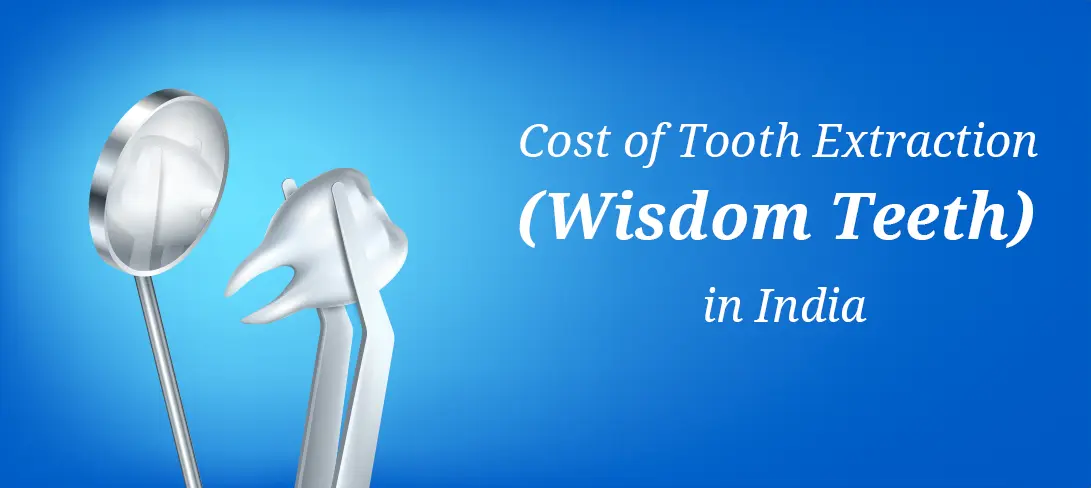
Cost of Tooth Extraction (Wisdom Teeth) in India
Tooth extraction is a common dental procedure that many people undergo for multiple reasons. The reason can vary from orthodontic issues, to the tooth being decayed or simple; pulling out a wisdom tooth. It may sound like a daunting experience, but understanding its necessity makes it better. The following blog will tell you everything you need to know before getting a tooth extraction done.
What is Tooth Extraction (Wisdom Teeth Removal)?
Tooth extraction refers to the removal of a tooth from its socket. Wisdom teeth, also known as third molars, erupt around the age of late adolescence/early adulthood. Sometimes when they don’t find space to come out in the jaw, they start erupting sideways, causing pain and swelling. While they may be painless sometimes, they can cause other issues such as crowding and infections. Thus, it is important to remove them to avoid further problems.
Why Do You Need Tooth Extraction?
Tooth extraction is recommended for several reasons, including:
- Impacted Wisdom Teeth
- Severe Tooth Decay or Damage
- Overcrowding
- Gum Disease
- Infections
Does Tooth Extraction Hurt?
Modern dental techniques and anesthesia ensure that tooth extraction is relatively painless. During the procedure, local anesthesia is used to numb the area, minimizing discomfort. While you may feel some pressure, sharp pain is uncommon. Post-extraction, mild soreness and swelling are typical but manageable with prescribed pain relievers and cold compresses.
What Influences the Cost of Tooth Extraction in India?
The cost of tooth extraction in India can vary based on several factors:
- Type of Extraction: Simple extractions are less expensive than surgical procedures.
- Complexity: Impacted or infected teeth may require more complex and costly procedures.
- Geographical Location: Costs can differ between urban and rural areas.
- Dentist’s Experience: Highly experienced dentists may charge higher fees.
- Clinic Facilities: Advanced technology and amenities can influence costs.
- Type of Anesthesia: General anesthesia or sedation typically increases the cost compared to local anesthesia.
How Much Does Tooth Extraction Cost in Clove Dental?
Here is an overview of typical tooth extraction costs in India:
| Type | Cost |
|---|---|
| Non-Surgical Firm Tooth Extraction | Rs. 1,890 – Rs. 6,390 |
| Impacted Tooth (Surgical Extraction) | Rs. 7,190 – Rs. 16,300 |
These estimates can vary depending on individual cases.
FAQs
Q: How long does the extraction procedure take?
A: Simple tooth extractions usually take about 20 to 40 minutes. If it’s a surgical tooth extraction, like with impacted wisdom teeth, it might take a bit longer. Your dentist will give you a rough idea based on the complexity.
Q: How long does recovery take?
A: Initial recovery from a tooth removal takes about a week. Complete healing? That’s usually done in 2–3 weeks, depending on your age, health, and whether it was a surgical extraction or not.
Q: Can I eat normally after extraction?
A: Not right away. Stick to soft, cold foods for the first 24 to 48 hours, think yogurt, smoothies, mashed potatoes. Then shift to a soft diet for the rest of the first week while the area heals.
Q: What are the risks of tooth extraction?
A. For most people, it’s smooth sailing, maybe a few days of soreness, nothing major. But watch out for red flags like severe pain, swelling, bleeding, fever, or numbness. These are rare, but if they happen, call your dentist.
Q: Is tooth extraction safe for everyone?
A: Mostly, yes. But here’s the thing: if you have any underlying health issues or take blood thinners or other medications, tell your dentist before the extraction. A quick heads-up can prevent serious complications.
Q. Does surgical extraction require hospitalization ?
A: Nope. Even surgical extractions, including complex wisdom tooth removal, are outpatient procedures. You’ll be in and out the same day—no hospital stay needed.
Q. Can removing upper teeth affect your eyesight?
This one’s a myth. There’s no nerve or anatomical connection between your upper teeth and your eyes that could cause vision loss. Tooth extraction, even of upper molars, won’t affect your sight.
Tooth extraction should be considered a last resort, except in cases of wisdom tooth removal or orthodontic treatment. Preserving natural teeth should always be the priority. However, if a tooth cannot be saved, extraction becomes necessary. In such cases, it’s essential to explore options for replacing the lost tooth.
DISCLAIMER: Please note that the prices mentioned in this blog: (a) present a range (depending upon the severity of the dental condition, the technology used in treatment, type of dental products used, etc.); (b) are true as on the date of this blog and may change on a later date, in accordance with the standard company policy; (c) may be subject to standard aberrations or generalizations on account of the use of AI in general Google/internet search by you.Leave a Reply
Leave a Reply
Explore More Similar Posts
Explore More Blogs



Leave a Reply